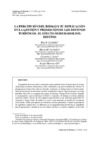Please use this identifier to cite or link to this item:
https://accedacris.ulpgc.es/jspui/handle/10553/107562
| Title: | La percepción del riesgo y su implicación en la gestión y promoción de los destinos turísticos: el efecto moderador del destino | Authors: | Carballo Fuentes, Rita Carballo, María Magdalena León González, Carmelo Javier Moreno Gil, Sergio |
UNESCO Clasification: | 531290 Economía sectorial: turismo | Keywords: | Gestión del riesgo Destinos turísticos |
Issue Date: | 2021 | Publisher: | Universidad de Murcia | Journal: | Cuadernos de Turismo | Abstract: | El propósito de este estudio es examinar como contribuyen los distintos tipos de riesgos (terrorismo, accidente, delincuencia, salud, catástrofes) a los que se enfrenta los turistas a la percepción de riesgo final sobre los destinos. Asimismo, el trabajo analiza el efecto moderador del destino en las relaciones causales establecidas entre los tipos de riesgos y el riesgo percibido. Para ello se comparan dos grupos de destinos: Europa (Islas Canarias, España) y Latinoamérica, con los destinos de Brasil y Colombia. El trabajo se realizó mediante encuestas online a través de una empresa especializada en los mercados potenciales de Alemania y Reino Unido. El análisis se llevó a cabo mediante un modelo de ecuaciones estructurales (SEM) para probar las relaciones causales planteadas. Aunque la percepción de seguridad y protección y su influencia en el comportamiento del turismo es importante para la promoción y gestión de las actividades turísticas, su análisis empírico ha recibido una atención limitada entre los investigadores. Los resultados de este trabajo muestran interesantes conclusiones prácticas y académicas para las organizaciones empresariales y la promoción de los destinos turísticos. The purpose of this study is to examine how the different types of risks (terrorism, accident, crime, health, catastrophes) that tourists face contributes to the perception of final risk on destinations. Likewise, the paper analyzes the moderating effect of destination in the causal relationships established between the types of risks and the perceived risk. For this, two groups of destinations are compared: Europe (Canary Islands, Spain) and Latin America, with the destinations of Brazil and Colombia. The work was carried out through online surveys through a company specialized in the potential markets of Germany and the United Kingdom. The analysis was carried out using a model of structural equations (SEM) to prove the causal relationships raised. Although the perception of safety and protection and its influence on the behavior of tourism is important for the promotion and management of tourism activities, its empirical analysis has received limited attention among researchers. The results of this work show interesting practical and academic conclusions for business organizations and the promotion of tourist destinations. |
URI: | https://accedacris.ulpgc.es/handle/10553/107562 | ISSN: | 1139-7861 | Source: | Cuadernos de turismo[ISSN 1139-7861], n. 47, p. 23-36 | URL: | http://dialnet.unirioja.es/servlet/articulo?codigo=7949547 |
| Appears in Collections: | Artículos |
Page view(s)
157
checked on Nov 16, 2024
Download(s)
125
checked on Nov 16, 2024
Google ScholarTM
Check
Share
Export metadata
Items in accedaCRIS are protected by copyright, with all rights reserved, unless otherwise indicated.
